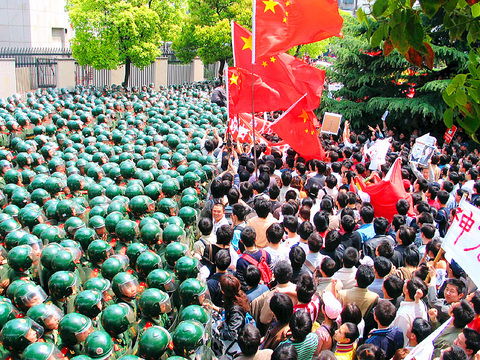Chanting "Japanese pigs get out!," protesters threw stones and broke windows at Japan's consulate and Japanese restaurants in Shanghai as tens of thousands of people defied government warnings and staged demonstrations yesterday against Tokyo's bid for a permanent UN Security Council seat.
Protests were reported in two other cities. But Beijing remained calm as police stood guard on Tiananmen Square to block a planned protest in the capital, a day ahead of a visit by Japan's foreign minister. Paramilitary police surrounded the Japanese Embassy, where protesters smashed windows last weekend.
The third weekend of protests erupted despite government demands for calm. Communist leaders apparently worry that the protests might do more damage to relations with Tokyo, which are at their lowest point in decades, or encourage others to take to the street to protest corruption or demand political reforms.

PHOTO: EPA
In Shanghai, as many as 20,000 protesters gathered around the Japanese Consulate. Police in riot helmets kept them away from the building but let protesters throw eggs and rocks. A group of young men broke the windows of a Nissan sedan and flipped it onto its roof.
In a nearby street, protesters broke windows at about 10 Japanese-style noodle shops and bars, many of them Chinese-owned. Others broke the windows of a police car, chanting "Kill the Japanese!," after a rumor spread that a man sitting inside was Japanese. The car drove away before the crowd could grab him.
The violence followed a march from City Hall to the consulate by about 5,000 people. They carried banners saying in English, "Say No to Japan in the Security Council" and chanted "Japanese pigs get out!"
A sign outside the consulate said, "Be Vicious Toward Japanese Devils."
"We have protested to the Foreign Ministry many times today, asking them to stop this violence," said Keiji Ide, spokesman for the Japanese Embassy in Beijing. "They promised to do their best."
A protest march in Hangzhou, southwest of Shanghai, attracted 10,000 people who shouted "slogans condemning Japanese militarism," the official Xinhua News Agency reported. In Tianjin, east of Beijing, about 2,000 protesters held a peaceful one-hour march.
Police also blocked a protest in the southern city of Guangzhou, shooing away people who tried to gather at a stadium.
Japan's foreign minister was preparing to fly to Beijing on Sunday for talks aimed at defusing the tensions. Japan warned its citizens in China about possible danger in advance of the protests. The US issued a similar warning.
Some suggested Beijing permitted the protests last weekend to support a campaign to block Tokyo's Security Council bid.
In Shanghai, police didn't try to stop the protest, though state newspapers said no one had received permission to hold one. At one point, police posted a sign saying, "March route this way."
Also see stories:

US President Donald Trump yesterday announced sweeping "reciprocal tariffs" on US trading partners, including a 32 percent tax on goods from Taiwan that is set to take effect on Wednesday. At a Rose Garden event, Trump declared a 10 percent baseline tax on imports from all countries, with the White House saying it would take effect on Saturday. Countries with larger trade surpluses with the US would face higher duties beginning on Wednesday, including Taiwan (32 percent), China (34 percent), Japan (24 percent), South Korea (25 percent), Vietnam (46 percent) and Thailand (36 percent). Canada and Mexico, the two largest US trading

AIR SUPPORT: The Ministry of National Defense thanked the US for the delivery, adding that it was an indicator of the White House’s commitment to the Taiwan Relations Act Deputy Minister of National Defense Po Horng-huei (柏鴻輝) and Representative to the US Alexander Yui on Friday attended a delivery ceremony for the first of Taiwan’s long-awaited 66 F-16C/D Block 70 jets at a Lockheed Martin Corp factory in Greenville, South Carolina. “We are so proud to be the global home of the F-16 and to support Taiwan’s air defense capabilities,” US Representative William Timmons wrote on X, alongside a photograph of Taiwanese and US officials at the event. The F-16C/D Block 70 jets Taiwan ordered have the same capabilities as aircraft that had been upgraded to F-16Vs. The batch of Lockheed Martin

GRIDLOCK: The National Fire Agency’s Special Search and Rescue team is on standby to travel to the countries to help out with the rescue effort A powerful earthquake rocked Myanmar and neighboring Thailand yesterday, killing at least three people in Bangkok and burying dozens when a high-rise building under construction collapsed. Footage shared on social media from Myanmar’s second-largest city showed widespread destruction, raising fears that many were trapped under the rubble or killed. The magnitude 7.7 earthquake, with an epicenter near Mandalay in Myanmar, struck at midday and was followed by a strong magnitude 6.4 aftershock. The extent of death, injury and destruction — especially in Myanmar, which is embroiled in a civil war and where information is tightly controlled at the best of times —

China's military today said it began joint army, navy and rocket force exercises around Taiwan to "serve as a stern warning and powerful deterrent against Taiwanese independence," calling President William Lai (賴清德) a "parasite." The exercises come after Lai called Beijing a "foreign hostile force" last month. More than 10 Chinese military ships approached close to Taiwan's 24 nautical mile (44.4km) contiguous zone this morning and Taiwan sent its own warships to respond, two senior Taiwanese officials said. Taiwan has not yet detected any live fire by the Chinese military so far, one of the officials said. The drills took place after US Secretary